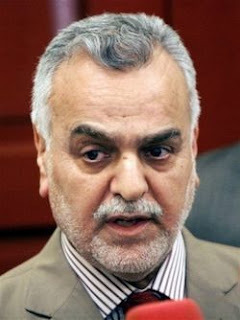 Iraqi Vice President Tariq al-Hashimi has threatened to pull his Sunni Arab bloc out of the Iraq coalition government, setting the stage for the civil war which many analysts expect to re-ignite and expand once American troops depart Iraq.
Iraqi Vice President Tariq al-Hashimi has threatened to pull his Sunni Arab bloc out of the Iraq coalition government, setting the stage for the civil war which many analysts expect to re-ignite and expand once American troops depart Iraq.
Al-Hashimi is demanding changes to the Iraq constitution by May 15, or he will resign and withdraw his 44 Sunni representatives from the Iraqi parliament. The vice president objects to the provision in the constitution which allows for autonomous regions to be created by any two or more of Iraq’s eighteen provinces, following a referendum of the population in the affected provinces. The Kurds in the northern part of the country have already formed such a region.
Al-Hashimi is concerned that the Shi’a majority in the country will attempt to form a similar autonomous zone in the south, the area that contains 80 percent of Iraq’s oil resources – the other 20 percent is in the Kurdish area. In the absence of a national oil law that shares the country’s oil wealth among all the citizens, the Sunnis fear that they will be marginalized even more than they already are.
The Sunnis are in a predicament. They comprise only 20 percent of Iraq’s population and inhabit the most inhospitable parts of the country. More importantly, they live in the area where there are no known oil reserves. The Shi’a Arab majority and the Kurds have resisted the enactment of oil sharing legislation, despite American pressure. Both groups believe that they should control the natural resources in their respective areas. The Kurds have already attempted to sign independent oil deals with European companies, cutting the national government in Baghdad out of the picture.
The situation in Kirkuk is another issue for the Sunni Arabs, this time with the Kurds. Most of the Sunni Arabs and Turkomans have been removed from the city in what some have called ethnic cleansing, similar to the removal of Sunni Arabs from most neighborhoods in Baghdad east of the Tigris River. The Sunnis feel they are being “ghetto-ized” into areas where they have few natural resources and no political impact. They may be right.
Al-Hashimi’s words are disturbing and fairly easy to analyze. "I would like to see the identity of my country, in fact, restored back. If Sunnis are not an equal partner in the government, they should say bye-bye to the political process. I'm not saying that I'm going to war, but Sunnis will be frustrated and people will think on other alternatives."
I see only one way to interpret these remarks: without a constitutional amendment that prevents the Shi’a from forming an autonomous region, and legislation for resource-sharing of oil revenues with all Iraqis, then the Sunnis will withdraw from the government and reignite the civil war to get what they perceive as their fair share.
Neither side appears willing to compromise. The Shi’a believe they finally have the upper hand – they are the majority of the population, have the majority of seats in the government and control most of the security apparatus of the country. They also sit on most of the oil resources.
The Kurds like being autonomous and are not likely to support a change to the constitution. They are in a loose coalition with the Shi’a, have a proportionate amount of oil in their enclave, and have no love lost for the Sunni Arabs, whom they blame for most of their persecution under the Ba’th regimes of Saddam Husayn and his predecessors.
There may be no way to prevent a civil war in Iraq.
skip to main
|
skip to sidebar
Twitter
.jpg)
An acknowledged Middle East expert, dynamic speaker, author of Ally to Adversary - An Eyewitness Account of Iraq's Fall from Grace, retired intelligence officer and recovering CNN and NBC military analyst Lt Col Rick Francona offers his thoughts and opinions on various Middle East topics.
Recommended by TIME.com, CNN.com, MSNBC.com and the Chicago Sun-Times.
Visit Rick's website
Index of Articles

View on your smart phone
Help defray our expenses to produce this commentary
.jpg)
An acknowledged Middle East expert, dynamic speaker, author of Ally to Adversary - An Eyewitness Account of Iraq's Fall from Grace, retired intelligence officer and recovering CNN and NBC military analyst Lt Col Rick Francona offers his thoughts and opinions on various Middle East topics.
Recommended by TIME.com, CNN.com, MSNBC.com and the Chicago Sun-Times.
Visit Rick's website
Index of Articles
Mobile browser

View on your smart phone
Archives
-
▼
2007
(
130
)
-
▼
May
(
12
)
- Timing of Iran talks insulting to troops
- 'On behalf of a grateful nation'
- Quoted about al-Qa'idah
- Potential for a new civil war in Lebanon?
- Should Prince Harry even be in the army?
- We already have a 'war czar'
- The real axis of evil
- Bremer speaks...again
- Iran and North Korea to improve relations?
- Do the Shi'a Iraqis want a civil war?
- Another step toward civil war in Iraq?
- National Guard not in Kansas anymore?
-
▼
May
(
12
)
